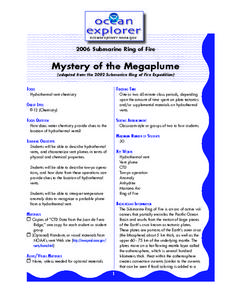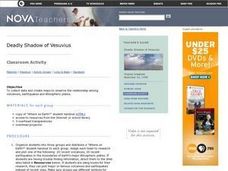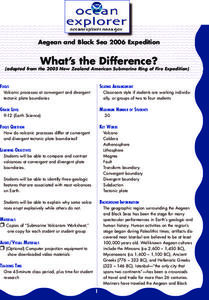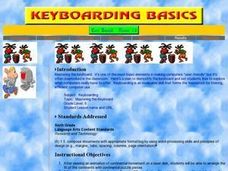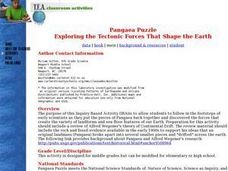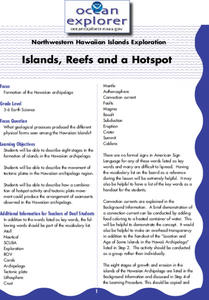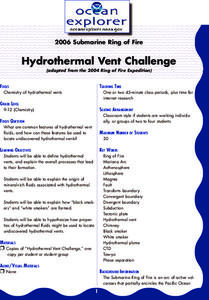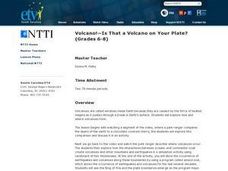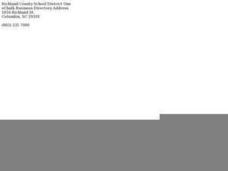Curated OER
Mystery of the Megaplume
Read through the extensive background information and then lead your geology or physical oceanography class through an investigation of actual temperature anomaly data from the Juan de Fuca ridge. They translate the data onto a plot,...
Curated OER
Heat Up the Floating Plates
Eighth graders research the connection between the convection currents within the mantle of the earth and the moving of Earth's plates. A connection to lessons at previous grade levels on the rock cycle and important background...
Curated OER
Earthquakes: Fifth Grade Lesson Plans and Activities
After learning about P waves and S waves, fifth graders view the intensity of earthquakes by examining seismographs and images of earthquake damage. Young scientists then forecasting future quakes by analyzing data about...
Curated OER
Cruising the Mantle
Students explore the plate boundaries of the earth. Through the use of video, internet and hands-on activities, students examine the types of plate boundaries. They create a model to illustrate the movement and interaction of the...
Curated OER
Deadly Shadow of Vesuvius
Students view a video clip about volcanoes. They collect data and create maps to see the relationship between volcanoes, earthquakes and plates. They share their maps with the class.
Curated OER
What's the Difference?
Students investigate volcanic processes at convergent and divergent
tectonic plate boundaries. They read and analyze diagrams, complete a worksheet, and write an essay.
Curated OER
Where Did They Come From?
Give science learners nine questions about the biogeography of hydrothermal vents and turn them loose to research this fascinating habitat. Working in cooperative groups, they prepare a report that addresses each of the questions. A...
Curated OER
The Volcano Factory
Collaborative groups work together to report on the volcanic activity leading to island formation and construct models to demonstrate the process. Consider having each group present their project to the rest of the class. There are many...
Curated OER
Mastering the Keyboard
Sixth graders view an animated program showing how the continents fit together millions of years ago. In groups, they compare and contrast the distribution of rocks and fossils based on how the continents fit together. After reading a...
Curated OER
Pangaea Puzzle: Exploring the Tectonic Forces That Shape the Earth
Sixth graders follow in the footsteps of early scientists as they put the pieces of Pangaea back together and discovered the forces that create the variety of landforms and sea-floor features of our Earth.
Curated OER
Islands, Reefs, and a Hotspot
Students describe eight stages in the formation of islands in the Hawaiian archipelago. They examine the movement of tectonic plates in the Hawaiian archipelago region, and describe how plate movement produced the Hawaiian archipelago.
Curated OER
My Friend, the Volcano
Working in cooperative groups, young scientists research and report on how undersea volcanic activity may benefit marine ecosystems. There are many links to websites that you can use to stimulate curiosity or for pupils to use for...
Curated OER
Hydrothermal Vent Challenge
Give our ocean voyagers the "Hydrothermal Vent Challenge!" It is a worksheet that guides them through an exploration of hydrothermal vents and the chemical reactions that occur when lava meets seawater. Using a collection of websites,...
Curated OER
The Fault Line
Students use cardboard models of the North American and Pacific plates and sand to investigate what happens when there is an earthquake or movement along the boundaries of the plates.
Curated OER
Volcano! Is That a Volcano on Your Plate?
Students investigate where volcanos come from. In this volcano lesson, students watch videos do Internet research and participate in experiments to discover the cause of volcanos.
Curated OER
Plate Tectonics
Students simulate the three types of plate boundaries using robots. For this earth science lesson, students explain how earthquakes and volcanoes are formed. They collect real-world earthquake data and plot them on the map.
Alabama Learning Exchange
Action at Plate Boundaries
Students diagram the spreading of the ocean floor. In this earth science lesson plan, students read an article on plate boundaries of the ocean. Students are expected to diagram the oceanic convergent boundary, and...
Curated OER
Plate Tectonics And Convection Currents
Students observe the currents that occur through convection in water and relate them to the currents in molten rock in the Earth's mantle. They set up a convection current in a cake pan of water using a bag of ice on one end and an...
Curated OER
Ring of Fire
Young scholars locate some of the 1,500 active volcanoes on a world map. Then by comparing their maps with a map of the world's tectonic plates, they discover that volcanoes occur because of the dynamic nature of the Earth's lithosphere.
Curated OER
My Friend, The Volcano
Students describe the positive impacts of volcanic activity on marine ecosystems. For this volcano lesson students explore the process that causes volcanic activity along the Mariana and Kermadec Island Arcs.
Curated OER
Frogs Frogs Frogs
Learners view a disk on the continental movement and analyze the given data on fossils, rock types and climate zones. For this geology lesson students draw a diagram of the earths layers, take a quiz complete a PowerPoint presentation.
Curated OER
The Moving Continents from Pangaea to the Future
Eighth graders examine how the movements of the Earth contribute to fossil distribution. In this fossils instructional activity students make maps of the placement of the continents.
NOAA
Where There's Smoke, There's ...
A remotely operated vehicle approaching a volcano was engulfed by molten sulfur where the plumes of fluids contained the highest concentrations of aluminum ever recorded. This isn't science fiction or an April fools joke, though it did...
Curated OER
Volcanoes: Sixth Grade Lesson Plans and Activities
Bring a set of pre-lab, lab, and post-lab lesson plans on volcanoes to your earth science unit. Sixth graders explore the three types of volcanoes found on Earth, plot the specific locations of these volcanoes on a map, and...


